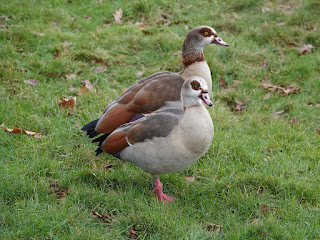The day wouldn't be the same without an imperious stare from the demanding Coal Tit in the corkscrew hazel. She rules, and she knows it.
There was also a Robin, but it's mild in comparison.
Duncan Campbell got a good picture of a Jay looking hungry in the same bush.
As I was on my way home lots of Great Tits and Blue Tits flocked into a blossoming bush at the Queen's Gate crossing of the Flower Walk, so it was feeding time all over again.
The very territorial Robin didn't like this, and perched on the railings under the bush nattering angrily. But that isn't actually its home bush, so it didn't chase the other birds out.
Black-Headed Gulls flew on to the waterlogged lawn near the Physical Energy statue to look for worms that had floated to the surface.
The Little Grebe and the Gadwall pair were in in the Italian Garden as usual.
They are now a close team working efficiently together. As far as I can work it out, the advantages for each are these. The Gadwalls eat algae, which they can reach by upending, and also they filter small creatures such as insect larvae and Daphnia water fleas out of the water. The Little Grebe's diving helps to stir these creatures up. The Little Grebe dives right into the algae to find slightly larger creatures such as snails. But it also eats Daphnia and larvae in the water, and the combined disturbance of the three birds makes these more available.
The dominant Mute Swan pair cruised back to the Italian Garden after a successful clearout of the Long Water.
The Egyptian Geese from the Henry Moore sculpture were having a change of scene on the west side of the Vista, which is now almost as swampy as the flat bit at the top of the hill where the gulls were.
A picture of a Beautyberry bush by Abigail. I wouldn't have called it that myself; the garish purple reminds me of a cheap plastic toy.
A sad picture of wanton destruction: the beautiful hazel thicket across the path at the bottom of the leaf yard has been completely cut down and the remains piled up in hideous 'dead hedges' -- these things are making the edges of the Long Water look increasingly like a tree graveyard. The idea is that they are good habitats for invertebrates, ignoring the fact that the invertebrates would have been doing better if the place had been left as it was.
Invertebrates are fashionable now, of course. The park is full of ugly woodpiles supposed to be 'insect hotels' and probably unused 'insect boxes' on trees. And there are those stupid notices telling you that instead of feeding the birds you should be looking for what they call 'minibeasts', as if we were primary schoolchildren. I find insects fascinating but they are what you might call a minority interest, and virtually none of the park visitors would have the faintest idea of where to look for them.
A note for people who had a subscription to this blog
Blogger have withdrawn their own subscription system, both for email and for RSS. I'm sorry about this, but there was nothing I could do. I've set up a new subscription service with a third party, follow.it -- this is very easy to join for email subscribers but less so (though possible and it's been done) for those who want RSS. Please see the panel at the top right of this page.


%202023%201a.jpg)





%202021%201a.jpg)

Thank you for the new subscription option.
ReplyDeleteI hope the RSS process isn't too much of a pain. I looked at it, but I don't use RSS and obviously I don't want to subscribe to my own blog.
DeleteYes, insects seem to be the new black.
ReplyDeleteDoesn't the imperious Coal Tit look like the teensiest bit like Queen Victoria?
Tinúviel
Indeed it does, definitely being Not Amused.
DeleteInteresting about the gadwall-grebe symbiosis. Agree with you about the "beauty" berry
ReplyDeleteI've never seen such close cooperation before. Yes, there are the Jackdaws in Richmond Park that eat the deer's ticks and similar examples such as the little bird that cleans the crocodile's teeth, but here both partners are actively at work for mutual benefit.
DeleteLovely shot of the Coal Tit.
ReplyDeleteSuch a photogenic little bird. Once they trust you they are all over you.
Delete